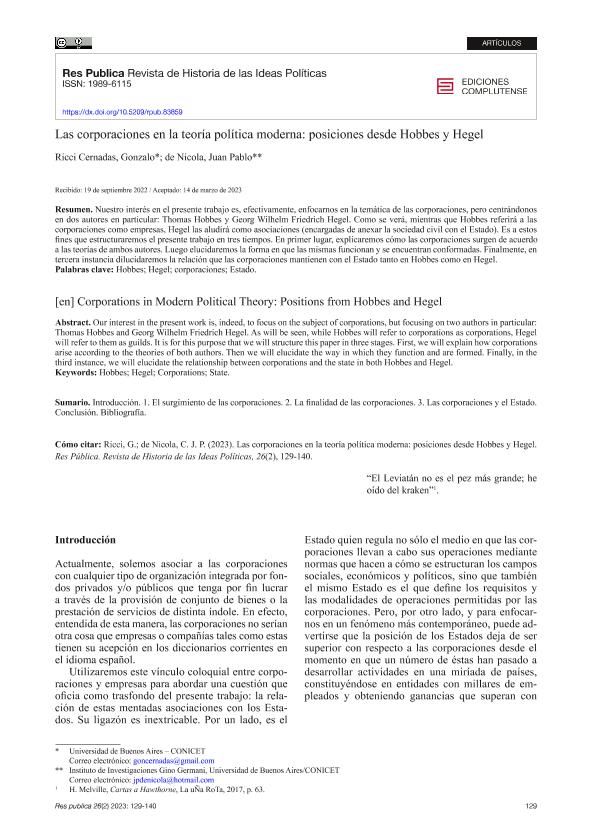Mostrar el registro sencillo del ítem
dc.contributor.author
Ricci Cernadas, Gonzalo

dc.contributor.author
de Nicola, Juan Pablo

dc.date.available
2023-12-27T14:49:18Z
dc.date.issued
2023-07
dc.identifier.citation
Ricci Cernadas, Gonzalo; de Nicola, Juan Pablo; Las corporaciones en la teoría política moderna: Posiciones desde Hobbes y Hegel; Universidad Complutense de Madrid; Res Publica; 26; 2; 7-2023; 129-140
dc.identifier.issn
1576-4184
dc.identifier.uri
http://hdl.handle.net/11336/221641
dc.description.abstract
Nuestro interés en el presente trabajo es, efectivamente, enfocarnos en la temática de las corporaciones, pero centrándonos en dos autores en particular: Thomas Hobbes y Georg Wilhelm Friedrich Hegel. Como se verá, mientras que Hobbes referirá a las corporaciones como empresas, Hegel las aludirá como asociaciones (encargadas de anexar la sociedad civil con el Estado). Es a estos fines que estructuraremos el presente trabajo en tres tiempos. En primer lugar, explicaremos cómo las corporaciones surgen de acuerdo a las teorías de ambos autores. Luego elucidaremos la forma en que las mismas funcionan y se encuentran conformadas. Finalmente, en tercera instancia dilucidaremos la relación que las corporaciones mantienen con el Estado tanto en Hobbes como en Hegel.
dc.description.abstract
Our interest in the present work is, indeed, to focus on the subject of corporations, but focusing on two authors in particular: Thomas Hobbes and Georg Wilhelm Friedrich Hegel. As will be seen, while Hobbes will refer to corporations as corporations, Hegel will refer to them as guilds. It is for this purpose that we will structure this paper in three stages. First, we will explain how corporations arise according to the theories of both authors. Then we will elucidate the way in which they function and are formed. Finally, in the third instance, we will elucidate the relationship between corporations and the state in both Hobbes and Hegel.
dc.format
application/pdf
dc.language.iso
spa
dc.publisher
Universidad Complutense de Madrid

dc.rights
info:eu-repo/semantics/openAccess
dc.rights.uri
https://creativecommons.org/licenses/by/2.5/ar/
dc.subject
HOBBES
dc.subject
HEGEL
dc.subject
CORPORACIONES
dc.subject
ESTADO
dc.subject.classification
Ciencia Política

dc.subject.classification
Ciencia Política

dc.subject.classification
CIENCIAS SOCIALES

dc.title
Las corporaciones en la teoría política moderna: Posiciones desde Hobbes y Hegel
dc.title
Corporations in Modern Political Theory: Positions from Hobbes and Hegel
dc.type
info:eu-repo/semantics/article
dc.type
info:ar-repo/semantics/artículo
dc.type
info:eu-repo/semantics/publishedVersion
dc.date.updated
2023-12-27T12:22:28Z
dc.identifier.eissn
1989-6115
dc.journal.volume
26
dc.journal.number
2
dc.journal.pagination
129-140
dc.journal.pais
España

dc.journal.ciudad
Madrid
dc.description.fil
Fil: Ricci Cernadas, Gonzalo. Universidad de Buenos Aires. Facultad de Ciencias Sociales; Argentina. Consejo Nacional de Investigaciones Científicas y Técnicas; Argentina
dc.description.fil
Fil: de Nicola, Juan Pablo. Consejo Nacional de Investigaciones Científicas y Técnicas; Argentina. Universidad de Buenos Aires. Facultad de Ciencias Sociales. Instituto de Investigaciones "Gino Germani"; Argentina
dc.journal.title
Res Publica

dc.relation.alternativeid
info:eu-repo/semantics/altIdentifier/url/https://revistas.ucm.es/index.php/RPUB/article/view/83859
dc.relation.alternativeid
info:eu-repo/semantics/altIdentifier/url/https://dialnet.unirioja.es/servlet/articulo?codigo=9043092
dc.relation.alternativeid
info:eu-repo/semantics/altIdentifier/doi/https://doi.org/10.5209/rpub.83859
Archivos asociados
